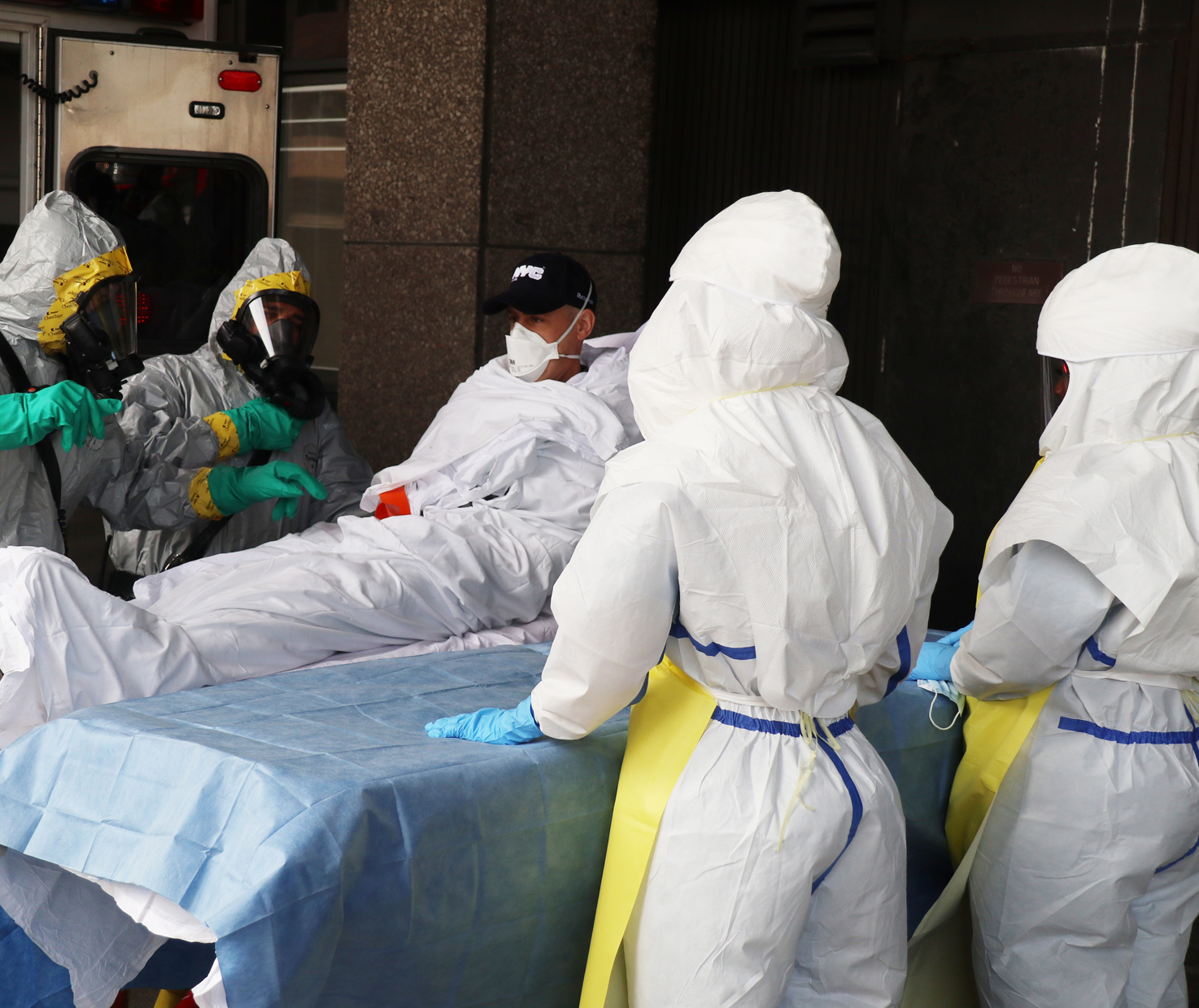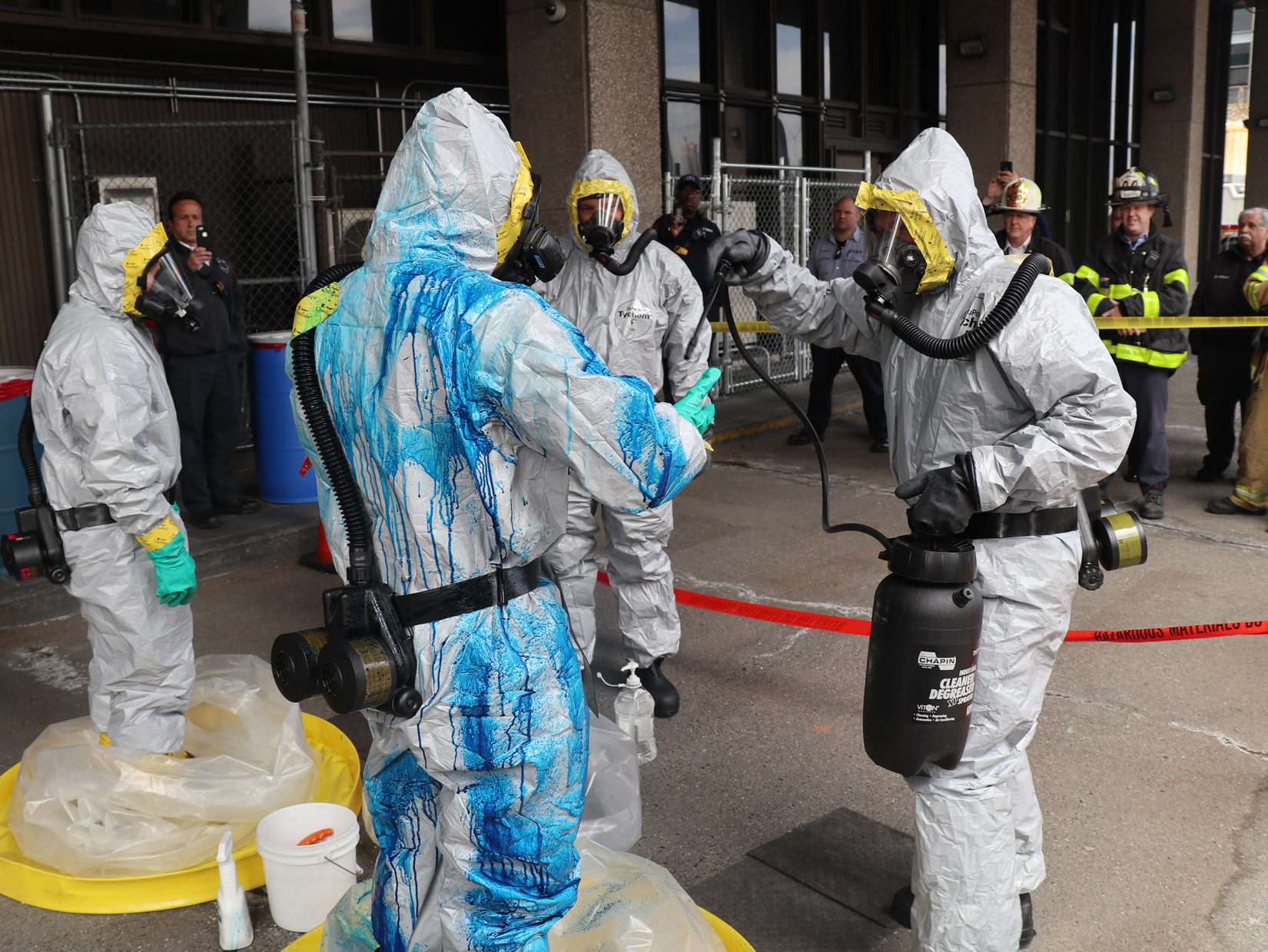New York City and New Jersey Health Departments Conduct Emergency Exercise to Safely Transport a Simulated Ebola Patient to NYC Health + Hospitals / Bellevue
The current outbreak of Ebola in the Democratic Republic of the Congo is the second largest outbreak in history with over 1,100 confirmed cases and 700 deaths
Federal funding for Ebola preparedness is set to expire in 2020

April 30, 2019 — In order to prepare for viral outbreaks occurring in other parts of the world, New York City and State partnered with first responders in New Jersey to conduct an emergency exercise last week to transport a person pretending to be an Ebola patient to NYC Health + Hospitals / Bellevue. Agencies that participated in the drill included the Health Department, NYC Health + Hospitals, the Fire Department of the City of New York, New York State Department of Health, the Robert Wood Johnson University Hospital, and health and law enforcement agencies from New Jersey. The exercise entailed the transfer of a person pretending to be an Ebola patient from Robert Wood Johnson University Hospital in New Jersey to the Regional Ebola and Other Special Pathogen Treatment Center at NYC Health + Hospitals / Bellevue in New York City.
Given the current outbreak of Ebola in the Democratic Republic of the Congo, which is the second largest Ebola outbreak in history with over 1,100 confirmed cases and 700 deaths, it is critical that the healthcare system is prepared to handle an actual case of Ebola or other infectious disease threat. Despite this critical need for readiness, federal funding for Ebola preparedness is set to expire in 2020, placing the future of these emergency response capabilities in jeopardy.

This exercise — the first of its kind between New York City and New Jersey – tested the health care system’s ability to safely move a patient to a clinical setting where Ebola can be most effectively treated. In particular, the exercise assessed the ability of participants to coordinate patient transportation to NYC Health + Hospitals / Bellevue, safely use biocontainment devices and personal protective equipment while caring for the patient, and appropriately decontaminate and dispose of equipment after transportation. Today’s unprecedented exercise involved over 70 staff from participating health care facilities and state and local agencies. Funding for this exercise was provided through the U.S. Assistant Secretary for Preparedness and Response (ASPR) Hospital Preparedness Program Ebola Preparedness and Response Activities cooperative agreement.
During the world’s largest outbreak of Ebola in 2014, a person returned to New York City with Ebola. Another individual with Ebola returned to Dallas; two nurses who cared for them were infected by the Ebola virus. These incidents reinforced the need for improved health care readiness to effectively counter emerging infectious disease threats. Congress responded by providing funding and directing ASPR to support health departments and health care systems to create a regional approach to safely and effectively care for future patients. As part of this regional approach, NYC Health + Hospitals/Bellevue was designated as a Regional Ebola and Other Special Pathogen Treatment Center in 2015, one of ten such centers across the country that receives federal funding to maintain the capability to safely manage patients with confirmed Ebola or other severe infectious diseases under short notice.
“New York City is a global city and must be ready to respond when global health issues become local,” said New York City Health Commissioner Dr. Oxiris Barbot. “It is essential for the Health Department to closely collaborate with City agencies, local health care facilities, and our partners in New Jersey so that we can prepare collaboratively for disease threats, like Ebola, and protect the health of New Yorkers when these deadly pathogens appear in our communities.”
“This training exercise further builds upon New York State’s 2014 Ebola Preparedness Plan that designated Bellevue Hospital as one of ten hospitals statewide to manage Ebola patients,” New York State Department of Health Commissioner Dr. Howard Zucker said. “In our interconnected world, we must be prepared to care for people from around the world and when global health concerns arrive here.”
“In New York City, we need to be ready for anything,” said Laura Evans, M.D., Medical Director of the Special Pathogens Program at NYC Health + Hospitals/Bellevue and Co-Principal Investigator for the National Ebola Training and Education Center (NETEC). “Bellevue’s Special Pathogens program, supported by ASPR’s Hospital Preparedness Program (HPP), provides vital support to our region for specialty care of patients with Ebola and other special pathogens. Our staff trains and exercises frequently to maintain a constant state of preparedness. As part of our preparedness activities, we invited several of our partners from NETEC to observe the exercise and provide feedback.”
NYC Health + Hospitals/Bellevue, Emory University and the University of Nebraska Medical Center/Nebraska Medicine jointly make up NETEC, funded by ASPR and CDC to increase the capability of US health care systems to safely and effectively manage individuals with suspected and confirmed infections with special pathogens.
“The NYC Health + Hospitals system’s response to the 2014 Ebola crisis was one of our finer moments where good preparation met a significant challenge. The work done at NYC Health + Hospitals/Bellevue is built on our history of responding to serious public health threats like smallpox, TB and AIDS. We see this as part of our core mission,” said William Hicks, Chief Executive Officer of NYC Health + Hospitals/Bellevue.
“When the Ebola virus reached New York City in 2014, our Paramedics, EMTs, and Firefighters executed a flawless operation that ensured the safety of their patient and all FDNY members who responded,” said Fire Commissioner Daniel A. Nigro. “That success was the result of extensive planning and training which is why we are proud to partner with the New York City Health Department, local hospitals, and state agencies to make certain we are all prepared for every potential public health emergency.”
“Practice is a key component of an effective emergency response. Today’s exercise tests our communications and coordination, and equips City, state, federal and regional partners with the knowledge and skills necessary to implement our core capabilities and strategies during high-stake, real-time emergencies,” NYC Emergency Management Commissioner Joseph Esposito said.
“One of the things we learned in 2014 was the need for robust communication and coordination across federal, state and local government,” said New Jersey Department of Health Principal Deputy Commissioner Jackie Cornell. “Given the diversity of our state and the volume of international travelers, New Jersey must stay prepared for Ebola and other highly communicable diseases that may make their way into our communities and health systems. Proactive planning for these types of public health emergencies saves lives.”
“The New Jersey Department of Health remains committed to working across all levels of government and with our partners in New York City to ensure that we are all prepared to coordinate an effective Ebola response,” said Christopher Neuwirth, Assistant Commissioner of the Division of Public Health Infrastructure, Laboratories and Emergency Preparedness at the New Jersey Department of Health. “Recognizing how challenging this effort is, it’s important to conduct these exercises to better understand where gaps may exist and validate our planning efforts. While we prepare for Ebola today, this work will benefit our preparedness and capabilities in responding to other novel diseases moving forward.”
“As a Level I Trauma Center and a state-designated Ebola Treatment Center, it is important for us to work closely and conduct exercises with our regional partners both in this state and in New York to ensure that we are ready to respond in the event that this virus or other potentially contagious pathogens arrive in our area,” said Paul Mikita, MA, RN, CEN, CEHP, MICN, Lead Emergency Preparedness Specialist at Robert Wood Johnson University Hospital. “These exercises allow us to share best practices among all partnering agencies and enhance our processes so that we remain at the highest level of preparation to protect the health and well-being of the communities we serve.”
The Health Department works with other City agencies as well as the entire health care system to improve system readiness. Exercises cover a range of scenarios, including natural disasters, disease outbreaks, terrorist attacks, or an active shooter. In addition to working with the health care system, the Health Department is charged with protecting the health of all New Yorkers by quickly identifying bioterrorism or naturally occurring outbreaks to stop the spread of disease through disease surveillance and laboratory testing. In an emergency, the Health Department offers mass vaccinations, mental health needs assessment, service coordination, clinical guidance, risk communication, and environmental mitigation. For more information on the Health Department’s emergency preparedness efforts, visit nyc.gov/health and search for “Emergency Prep.”
About Robert Wood Johnson University Hospital
Robert Wood Johnson University Hospital (RWJUH) New Brunswick, an RWJBarnabas Health Facility, is a 600-bed academic medical center that serves as the principal teaching hospital of Rutgers Robert Wood Johnson Medical School and the flagship Cancer Hospital of Rutgers Cancer Institute of New Jersey. Its Centers of Excellence include cardiovascular care from minimally invasive heart surgery to transplantation, cancer care, stroke care, neuroscience, orthopedics, bariatric surgery and women’s and children’s care including The Bristol-Myers Squibb Children’s Hospital at Robert Wood Johnson University Hospital. A Level 1 Trauma Center and the first designated Pediatric Trauma Center in the state, RWJUH’s New Brunswick campus serves as a national resource in its ground-breaking approaches to emergency preparedness.
About NYC Health + Hospitals/Bellevue
NYC Health + Hospitals/Bellevue is America’s oldest public hospital, established in 1736. Affiliated with the NYU School of Medicine, the 844-bed hospital is a major referral center for highly complex cases, with its 6,000 employees including highly skilled, interdisciplinary clinical staff. It sees more than 110,000 emergency room visits and 500,000 outpatient visits annually. It is a Level 1 Trauma Center and sees more than 110,000 emergency room visits and 500,000 outpatient visits annually. Clinical centers of excellence include: Emergency Medicine and Trauma Care; Cardiovascular Services; Designated Regional Perinatal Center and Neonatal Intensive Care Unit (ICU); Comprehensive Children’s Psychiatric Emergency Program; and Cancer Services. For more information, visit NYC Health + Hospitals/Bellevue online, or find us on twitter.com/BellevueHosp.
About NYC Health + Hospitals
NYC Health + Hospitals is the largest public health care system in the nation serving more than a million New Yorkers annually in more than 70 patient care locations across the city’s five boroughs. A robust network of outpatient, neighborhood-based primary and specialty care centers anchors care coordination with the system’s trauma centers, nursing homes, post-acute care centers, home care agency, and MetroPlus health plan—all supported by 11 essential hospitals. Its diverse workforce of more than 42,000 employees is uniquely focused on empowering New Yorkers, without exception, to live the healthiest life possible. For more information, visit Health + Hospitals online and stay connected on Facebook or Twitter at @NYCHealthSystem.# # #
#028-19
MEDIA CONTACT:
- Patrick Gallahue/Stephanie Buhle, NYC Health Department, (347) 396-4177
pressoffice@health.nyc.gov - Evelyn Hernández, NYC Health + Hospitals/Bellevue, (212) 562-4516




